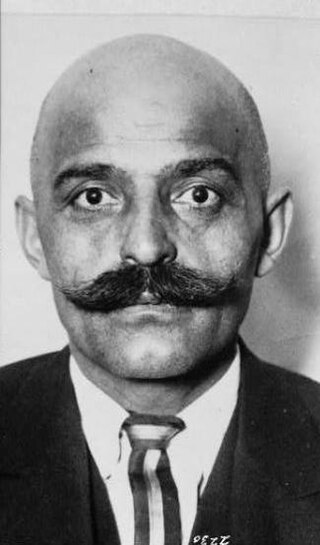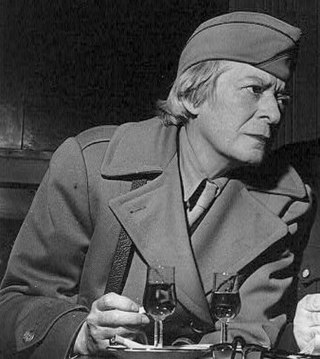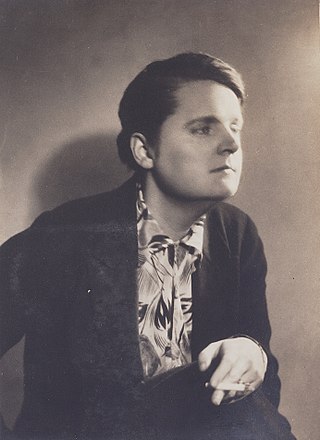
The Nun's Story is a 1956 novel by Kathryn Hulme. It was a Book of the Month selection and reached #1 on The New York Times Best Seller list.

George Ivanovich Gurdjieff was a Greek–Armenian philosopher, mystic, spiritual teacher, composer, and movements teacher. Gurdjieff taught that people are not conscious of themselves and thus live their lives in a state of hypnotic "waking sleep", but that it is possible to awaken to a higher state of consciousness and serve our purpose as human beings. The practice of his teaching has become known as "The Work" and is additional to the ways of the Fakirs (Sufis), Monks and Yogis, so that his student P. D. Ouspensky referred to it as the "Fourth Way".

Janet Flanner was an American writer and pioneering narrative journalist who served as the Paris correspondent of The New Yorker magazine from 1925 until she retired in 1975. She wrote under the pen name "Genêt". She also published a single novel, The Cubical City, set in New York City.
Miriam Schlein was an American author who wrote nearly 100 books that helped teach children about animals and more obscure ideas such as space and time. Her books include Discovering Dinosaur Babies (1991), The Dino Quiz Book (1995), and Before the Dinosaurs (1996).

Jean Toomer was an American poet and novelist commonly associated with the Harlem Renaissance, though he actively resisted the association, and with modernism. His reputation stems from his novel Cane (1923), which Toomer wrote during and after a stint as a school principal at a black school in rural Sparta, Georgia. The novel intertwines the stories of six women and includes an apparently autobiographical thread; sociologist Charles S. Johnson called it "the most astonishingly brilliant beginning of any Negro writer of his generation". He resisted being classified as a "Negro" writer, as he identified as "American". For more than a decade Toomer was an influential follower and representative of the pioneering spiritual teacher G.I. Gurdjieff. Later in life he took up Quakerism.

Margaret Caroline Anderson was the American founder, editor and publisher of the art and literary magazine The Little Review, which published a collection of modern American, English and Irish writers between 1914 and 1929. The periodical is most noted for introducing many prominent American and British writers of the 20th century, such as Ezra Pound and T. S. Eliot, in the United States and publishing the first thirteen chapters of James Joyce's then-unpublished novel Ulysses.

Alice Brown was an American novelist, poet and playwright, best known as a writer of local color stories. She also contributed a chapter to the collaborative novel, The Whole Family (1908).
Monica Baldwin was a British writer. She spent the first half of her adult life as a Catholic nun, and is notable for the memoir she wrote after leaving her enclosed religious order.

The Watsons is an abandoned novel by Jane Austen, probably begun about 1803. There have been a number of arguments advanced as to why she did not complete it, and other authors have since attempted the task. A continuation by Austen's niece was published in 1850. The manuscript fragment itself was published in 1871. Further completions and adaptations of the story have continued to the present day.

The Nun's Story is a 1959 American drama film directed by Fred Zinnemann and starring Audrey Hepburn, Peter Finch, Edith Evans, Peggy Ashcroft, and Dean Jagger. The screenplay was written by Robert Anderson, based on the 1956 novel of the same name by Kathryn Hulme. The film tells the life of Gabrielle Van Der Mal (Hepburn), a young woman who decides to enter a convent and make the many sacrifices required by her choice.

Lillian Hoban was an American illustrator and children's writer best known for picture books created with her husband Russell Hoban. According to OCLC, she has published 326 works in 1,401 publications in 11 languages.

Jane Heap was an American publisher and a significant figure in the development and promotion of literary modernism. Together with Margaret Anderson, her friend and business partner, she edited the celebrated literary magazine The Little Review, which published an extraordinary collection of modern American, English and Irish writers between 1914 and 1929. Heap herself has been called "one of the most neglected contributors to the transmission of modernism between America and Europe during the early twentieth century."

Gregory Zilboorg was a psychoanalyst and historian of psychiatry who is remembered for situating psychiatry within a broad sociological and humanistic context in his many writings and lectures.

The Congregation of the Sisters of Charity of Jesus and Mary is a Roman Catholic religious institute founded in Ghent, Belgium. An enclosed religious order, its main apostolate is helping the needy and the sick, inspired by the work of Saint Vincent de Paul and Saint Bernard of Clairvaux.

Olivia Rossetti Agresti (1875–1960) was a British activist, author, editor, and interpreter. A member of one of England's most prominent artistic and literary families, her unconventional political trajectory began with anarchism, continued with the League of Nations, and ended with Italian Fascism. Her involvement with the latter led to an important correspondence and friendship with Ezra Pound, who mentions her twice in his Cantos.
Marie Louise Habets was a Belgian nurse and former religious sister whose life was fictionalised as Sister Luke in The Nun's Story, a bestselling 1956 book by American author Kathryn Hulme. The Belgian-born actress Audrey Hepburn portrayed Gabrielle van der Mal in the 1959 Fred Zinnemann film The Nun's Story, and was nominated for the Academy Award for Best Actress.

Solita Solano was an American writer, poet and journalist.
James Lord was an American writer. He was the author of several books, including critically acclaimed biographies of Alberto Giacometti and Pablo Picasso. He appeared in the documentary films Balthus Through the Looking Glass (1996) and Picasso: Magic, Sex, Death (2001).
Ruth Pine Furniss (1893–1957) was an American writer who published several short stories and novels.

Esther Strachey was an American academic, historian, and socialite.














